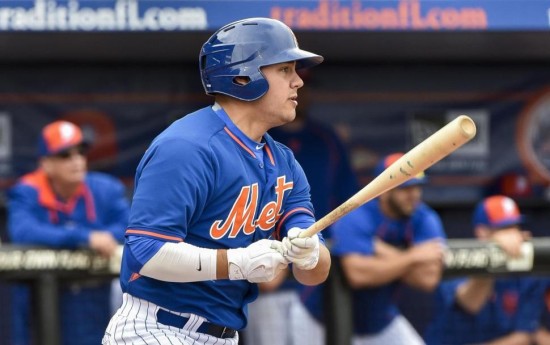
The Mets of recent years, while not experiencing a lot of success at the major league level, have slowly and patiently reconstructed a minor league system that is a consensus top 5 ranked organization. The front office has been patient and careful with this talent, perhaps to a fault. The Mets have been in need of some positional help in 2015 that could have been addressed via trade, but it hasn’t happened.
As a result, the Mets will soon have several players knocking on the door. One of them will almost certainly be Michael Conforto. The young 2014 first rounder out of Oregon State who made such an impression in Saturday’s Grapefruit League win over the Braves, going 3-for-4 with a double and three runs batted in.
Now I don’t know much, I’m just a guy sitting at home watching the games. I’m not a scout or a talent evaluator. I’ve played some and I’ve coached some, and I’ve watched a whole lot of baseball during my 49 years, and from what I saw on Saturday, Conforto looks like he could probably play at the major league level right now. It’s all about the swing.
You look at a lot of guys (Ike would be a good example) who come up these days with these big power strokes and you worry about their ability to time the off-speed stuff and make contact against the breaking pitch. You look at their impatience and tendencies in and out of the zone, their lack of plate discipline. I don’t see any of that with Conforto. I see a guy with a real good approach, a very good eye, and a killer-quick compact swing. This kid will hit, that much is obvious.
So why not speed him up? Start the year at Binghamton and then send him to Vegas with an outside shot at a September call up? Well the company line is “we want to be patient, let them develop, bring them up when we know they’re ready.”
An interesting situation has been fomenting in this regard on the North Side of Chicago with a big third base prospect named Kris Bryant. As reported by CBS Sports Chicago, MLBPA executive director Tony Clark made the following statement to the Tribune:
“I will always pay attention during the course of the year as guys come up, go down, different considerations that may be a part of those decisions. This year is a little different than in years past here as it’s a remarkably talented group in that locker room. There’s a very good group of veterans, a very good group of young talented players and selfishly I’m interested to see how everything falls into place.”
“But as it relates to when someone may come up, when they may not, those are all things we pay very close attention to and as the year goes along, we’ll see where we end up.”
Apparently the MLPA is none too happy with teams delaying the service clock of players, thereby setting back their eligibility for free agency by a year, even though it’s permissible under the current CBA, and, really, a pretty smart practice. Predictably, Theo Epstein answered back, turning up the sarcasm:
“I haven’t talked directly to Tony about it, so I’ll withhold comment. But I didn’t know we needed players association permission to send a player to the minor leagues who’s not even on the 40-man roster and has less than 300 plate appearances at Triple-A. That’d be a new one to me.”
The cynical nature here is almost reminiscent of an Alderson to Boras retort!
Theo promptly went on to not withhold comment with the following:
“Just evaluating him from a baseball standpoint, I’m kind of laughing at how big of a story this has become. The reality is for players with less than 300 plate appearances or 250 at-bats, whatever it is at Triple-A, the norm is to get more seasoning.
In Kris’ case, he changes people’s perception because he’s so mature, he’s so advanced. He handles things in stride. He comes across as a 30-year-old veteran even though he’s only 23. So I think that’s gotten people a little ahead of themselves. And look, Kris is in camp competing, and he’s in camp trying to get better.”
“When we talk about Kris Bryant, we don’t talk about service time — not a single conversation. What we talk about is his evolution as a baseball player, his development, his strengths and his weaknesses and how much time we feel he still needs at Triple-A before he’s ready to come up and make an impact in the big leagues. You don’t get that time back. If you call someone up prematurely and they struggle, sometimes it turns out fine and you can send them back and they come back and it’s no harm, no foul. Other times you can derail a player’s career.”
“We’re just trying to get this one right. Do the right thing for our big league club. Do the right thing for Kris’ development. Those are our decisions. They’re baseball decisions, and that’s how we’ll make them.”
Then again maybe it isn’t something Alderson would say. I’m pretty sure Sandy wouldn’t tip his hand by going out of his way to elaborate at length on a sensitive topic … It’s never a good idea to give up more information than you absolutely need to … Theo’s touchy disposition speaks volumes. Are teams trying to find ways to delay service time for “can’t miss” prospects thereby putting off arbitration?
The short answer is, of course, why wouldn’t they?
As with many things related to free agency, service time goes back to reserve clause precedents that once upon a time allowed teams who developed players to control them in perpetuity. But that has not been the case since Curt Flood sued MLB and lost, leading to the Messersmith and McNally challenge in December of 1975 when players finally won the right to free agency.
Service time stipulations in current CBA manifestations are essentially the last vestige of the reserve clause. Teams successfully continue to argue that they should be rewarded and in a sense benefit from the fruits of drafting and developing labor, by controlling players for some fair and predetermined length of time, (what currently amounts to around 6 years total with the latter three being arbitration years). MLB explains arbitration thus:
A player with three or more years of service, but less than six years, may file for salary arbitration. In addition, a player can be classified as a “Super Two” and be eligible for arbitration with less than three years of service. A player with at least two but less than three years of Major League service shall be eligible for salary arbitration if he has accumulated at least 86 days of service during the immediately preceding season and he ranks in the top 22 percent (increased from 17 percent in previous agreements) in total service in the class of Players who have at least two but less than three years of Major League service, however accumulated, but with at least 86 days of service accumulated during the immediately preceding season.
So a team may benefit considerably by delaying a player’s start time because it can delay arbitration eligibility. This can potentially do a couple of things. In a talented (top 22%) player who is around the age of Bryant (and Conforto) it will ensure that a good portion of the player’s prime years are swallowed up by arbitration, and secondly, it will delay free agency by up to a year on the back end. Cost control and control of early prime. The benefits of delaying start time from a team standpoint are enormous.
So it’s hard for me to believe that financial considerations aren’t a factor here. In Conforto’s case, we may very well have a kid who could benefit from some additional “seasoning,” but you have to imagine Mets front office honchos have almost certainly calculated the financial benefits of being “patient” in a general sense, particularly when you are currently on a budget that’s been squeezed like a capybara in a python.
The MLBPA is right to be concerned. The game is changing. We are in the midst of a dramatic shift back to pre-steroid norms and the age of onset, if you will, is trending younger. Players are coming up bigger, stronger, more mature, while at the same time older players are breaking down younger and at higher rates. We need look no further than our own David Wright which only a few years ago would have still been considered in his “prime.” As a result of this, teams who have shifted to youth movements should enjoy a pronounced competitive advantage.
It’s a bigger issue than we think. When you consider that player careers are no longer artificially or chemically lengthened, a player has only so much time to compile a body of work, a career, a legacy, a hall of fame portfolio.
Clark did make one more point:
“I will tell you this – we have always and will continue to believe that it’s in everyone’s best interest to have the best players playing at any particular time,”
If teams eat into these early years by delaying start time, it takes away not only from their career accomplishments, it also deprives the fans of seeing young dynamic players who may very well be more than ready.
And unless my eyes deceive me, Conforto is one of them.















